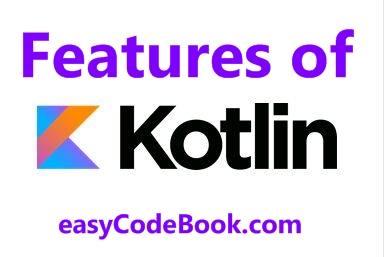Main Features of Kotlin Programming Language – Kotlin is a versatile language used not only in Android app development but also in server-side development, web applications, and various other domains. Its modern features, combined with Java interoperability, make it an appealing choice for developers looking to improve productivity and code quality.

Key features and aspects of Kotlin include:
- Interoperability with Java: Kotlin can seamlessly work with existing Java codebases. You can call Java code from Kotlin and vice versa without any issues, making it an excellent choice for transitioning or enhancing existing Java projects.
- Develop Android apps with Kotlin
Write better Android apps faster with Kotlin. Kotlin is a modern statically typed programming language used by over 60% of professional Android developers that helps boost productivity, developer satisfaction, and code safety. - Cross-Platform Development: Kotlin Multiplatform allows you to share code between different platforms, such as Android, iOS, and the web. This can significantly streamline cross-platform development.
- Open Source: Kotlin is open-source, and its development is community-driven. It has a growing ecosystem of libraries and tools contributed by developers worldwide.
- Concise Syntax: Kotlin offers a concise and expressive syntax that allows developers to write code that is more readable and maintainable. It reduces boilerplate code found in Java, making it more efficient.
- Functional Programming: Kotlin incorporates functional programming concepts, such as first-class functions, lambdas, and higher-order functions. This allows for more concise and expressive code and makes Kotlin suitable for functional programming paradigms.
- Null Safety: Kotlin addresses the notorious problem of null references by distinguishing between nullable and non-nullable types at the language level. This helps prevent null pointer exceptions, a common source of bugs in many other languages.
- Type Inference: Kotlin provides strong static typing while also allowing you to omit explicit type declarations in many cases, thanks to type inference. This simplifies code and reduces verbosity.
- Extension Functions: Kotlin allows you to extend the functionality of existing classes without modifying their source code. This feature is particularly useful for adding methods to built-in classes or third-party libraries.
- Smart Casts: Kotlin’s type system includes smart casts that automatically cast a variable after a type check. This eliminates the need for explicit type casting in many situations.
- Coroutines: Kotlin offers built-in support for coroutines, which simplifies asynchronous and concurrent programming. Coroutines provide an elegant way to manage asynchronous tasks without the complexities of traditional callback-based or thread-based approaches.
Kotlin is widely adopted in the Android development community, and it’s also used in various other domains, including server-side development, web development, and desktop applications. Its combination of modern language features and Java compatibility makes it a popular choice for many software development projects.
![]()